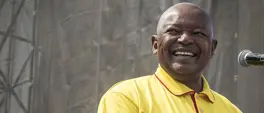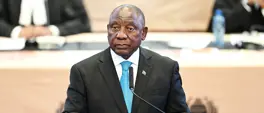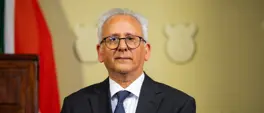CHRIS OXTOBY & JUDITH FEBRUARY | 2025: A challenging year for the judiciary and the rule of law
Guest contributor
28 November 2025 | 8:12'This year feels like a year in which a lot has happened and yet not much has changed regarding these fundamental issues. But at the same time, there is the distinct sense that the judiciary is operating in an increasingly difficult environment, and that the rule of law is under strain.'
- Judiciary
- Constitutional Court
- Judicial Service Commission (JSC)
- Dunstan Mlambo
- Selby Mbenenge
- Legal Practice Council (LPC)
- Cyril Ramaphosa
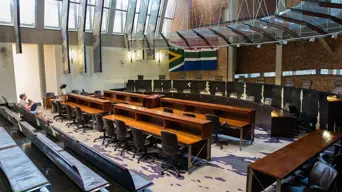
The Constitutional Court. Picture: Ashraf Hendricks/GroundUp
At the beginning of this year, we previewed what 2025 had in store for the judiciary, and for the rule of law in South Africa more generally.
We anticipated a “busy year” for the judiciary, highlighting, amongst other issues, the ongoing challenges to the functioning of the Constitutional Court in dealing with its workload; the need for the Judicial Service Commission (JSC) to restore confidence in how it performs its function in the appointment of judges; several significant misconduct complaints against judges; and the impact of high profile political cases coming before the courts.
Viewed against this backdrop, 2025 feels like a year in which a lot has happened and yet not much has changed regarding these fundamental issues. But at the same time, there is the distinct sense that the judiciary is operating in an increasingly difficult environment, and that the rule of law is under strain.
Consider, for example, the issue if the Constitutional Court and its workload.
We noted at the beginning of the year that there had not been any clear action on the issue during2024 and cautioned that the issue should not be allowed to slide. And yet, there continues to be little discernible progress in adopting practical solutions to address the problem. In public statements, judicial leaders have indicated that steps are being taken, but the results of these endeavours have not yet been revealed.
Meanwhile, there continues to be significant delays in the court handing down judgments, including in politically sensitive matters, which must be harmful to public confidence in the judiciary.
Some help should be on the way through the long overdue appointments of permanent judges being made. There have been longstanding concerns about failures to fill vacancies on the Apex Court. After a long delay in filling the position, Justice Dunstan Mlambo was appointed as the new Deputy Chief Justice.
An experienced judge with an excellent leadership track record, Mlambo can be expected to make important contributions to the Apex Court and the judiciarygenerally. And at its October sitting, the JSC was finally able to recommend enough candidates to fill two longstanding vacancies on the Constitutional Court, although at the time of writing President Cyril Ramaphosa had yet to make the appointments.
Indeed, there were some cautious grounds for optimism in the JSC’s performance this year, with evidence of a fair but rigorous approach to the interviews of candidates, and the year was mercifully free of the type of major controversies, which in the past have blighted the JSC’s reputation.
There were, however, concerns raised at the October sitting that the commission’s shortlisting processes were not sufficiently rigorous, which the JSC will hopefully address in the future.
A development of great significance for the JSC was a judgment by the Western Cape High Court ruling that impeached former judge and subsequent MK Party member John Hlophe could not be designated as a member of the JSC. This decision is extremely important for protecting the integrity and independence of the judiciary, and for upholding the rule of law. Attempts have been made to appeal the decision, although it remains to be seen what impact Hlophe’ suspension by the MK Party will have on the further conduct of the litigation.
On the issue of holding judges accountable, there has been progress on several complaints during the year. The tribunal dealing with a complaint of sexual harassment against Eastern Cape Judge President Selby Mbenenge has attracted considerable public attention and important debates about power dynamics and workplace conduct in the judicial context.
The tribunals decision is currently pending, and the outcome will provide an important litmus test of how complaints of this nature against judges are dealt with.
In this context, the adoption of a sexual harassment policy for the judiciary was another significant development. Other notable events relating to the accountability of judges included findings by conduct tribunals that judges Nana Makhubele and Mushtak Parker had committed gross misconduct.
Parliament will now consider whether the judges will be removed from office.
The implications of a decision by the Judicial Conduct Committee, finding that judges who had retired from active service could not be removed from judicial office, raised disquiet, and the issue is one that is worth monitoring closely. (The complaint in question, against retired judge Anton Van Zyl, was referred to an inquiry, the outcome of which is not yet determined).
The process of holding judges accountable thus has room for improvement.
It is crucially important to protect the rule of law and ensure public confidence in thejudiciary that judges who commit serious misconduct are properly held to account, including being removed from office in the most serious from cases. The importance of this issue was highlighted as this article was being finalised, when it was reported that a high court judge had been arrested on charges of corruption. This follows earlier reports of allegations of bribery against a different high court judge.
It cannot be emphasised strongly enough just how damaging these allegations are for the judiciary. If true, such conduct fundamentally undermines the rule of law and the constitutional order. It is, therefore, crucial that the allegations are dealt with promptly, transparently and credibly.
The allegations also highlight how crucial it is to get the appointment of judges right. It is far better to avoid bad appointments being made in the first place, rather than having to remove a judge for gross misconduct once they have already been appointed.
As we note below, there have een recent signs of greater rigour from members of the JSC, but the consequences of problematic appointments in the past are far-reaching and hard to undo.
The JSC will, therefore, need to be uncompromising in scrutinising the background and track record of all candidates who appear before it. Allegations against judges do not take place in isolation. Concerns were regularly raised during the year about the state of ethics in the legal profession generally, and with the Legal Practice Council’s performance in holding practitioners to account. This will be a critical area to watch in the future. Continued failures to uphold the highest ethical standards in the legal profession also risk fundamentally undermining the Constitution and the rule of law.
An area where there has been progress relates to ensuring the institutional independence of the judiciary by reforming the governance and administrative structures of the judiciary. Successive Chief Justices have worked hard to achieve this, although the specifics of how (and when) the changes will take place remain to be seen. With high-profile allegations of bribery corruption having been levelled at court staff of the Mthatha High Court, this will be another area where strong and effective governance will be required from whatever entity is ultimately in control.
These numerous challenges facing the courts and the judiciary take place in a wider context where the rule of law faces serious threats. Assassinations of prosecutors and lawyers risk fundamentally undermining the fight against crime and corruption.
The allegations by KwaZulu-Natal Police Commissioner Nhlanhla Mkhwanazi and the evidence subsequently led at the Madlanga Commission of Inquiry and Parliament's ad hoc committee probing polcie corruption, demonstrate just how parlous the state of law enforcement and the criminal justice sector is. The justice system is, therefore, under pressure and showing signs of strain.
Institutions such as the judiciary need to be both supported and held to account to ensure the rule of law continues to function. We must all be concerned about the impact in the long term if the faultlines that 2025 has revealed are not addressed effectively.
Get the whole picture 💡
Take a look at the topic timeline for all related articles.
Trending News
More in Opinion

4 March 2026 08:33
CHARLES MATSEKE | War in the Middle East and South Africa’s maritime moment

3 March 2026 11:40
Who belongs in South Africa? UCT philosopher weighs in on identity and ownership
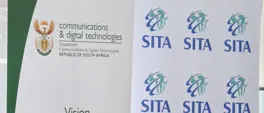
2 March 2026 11:05
TLALI TLALI |Mandate, money and accountability - What the government website debate really reveals



